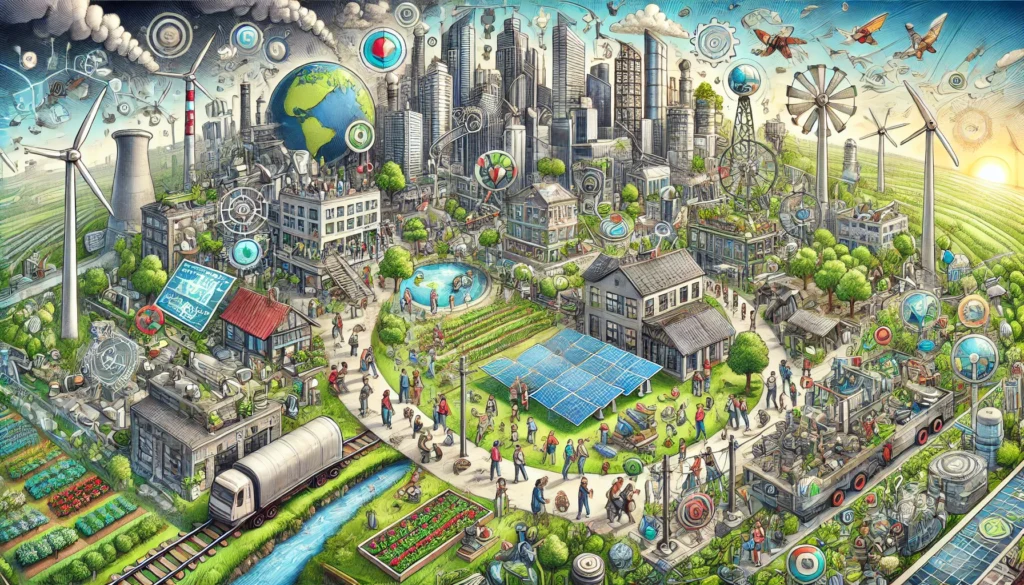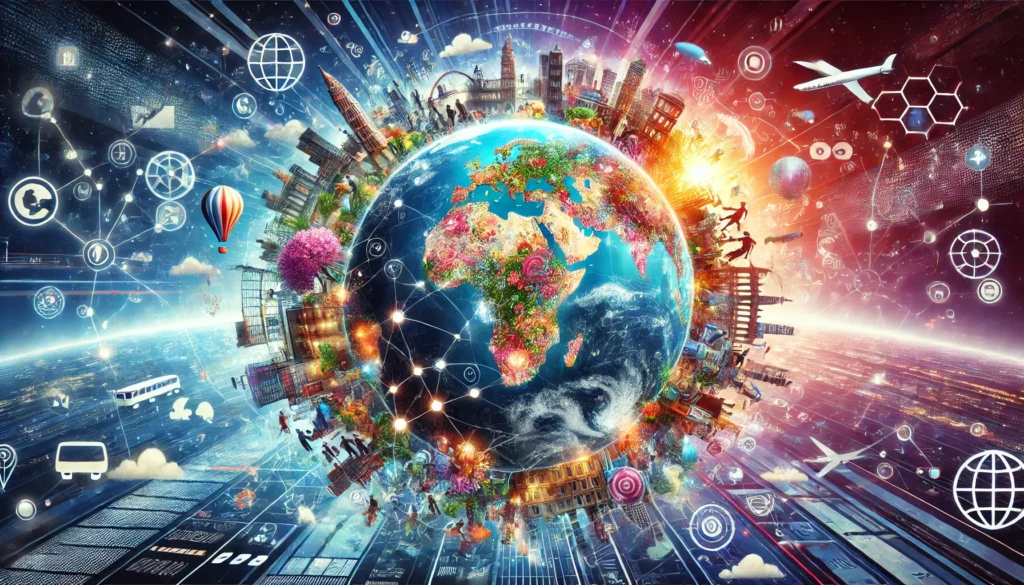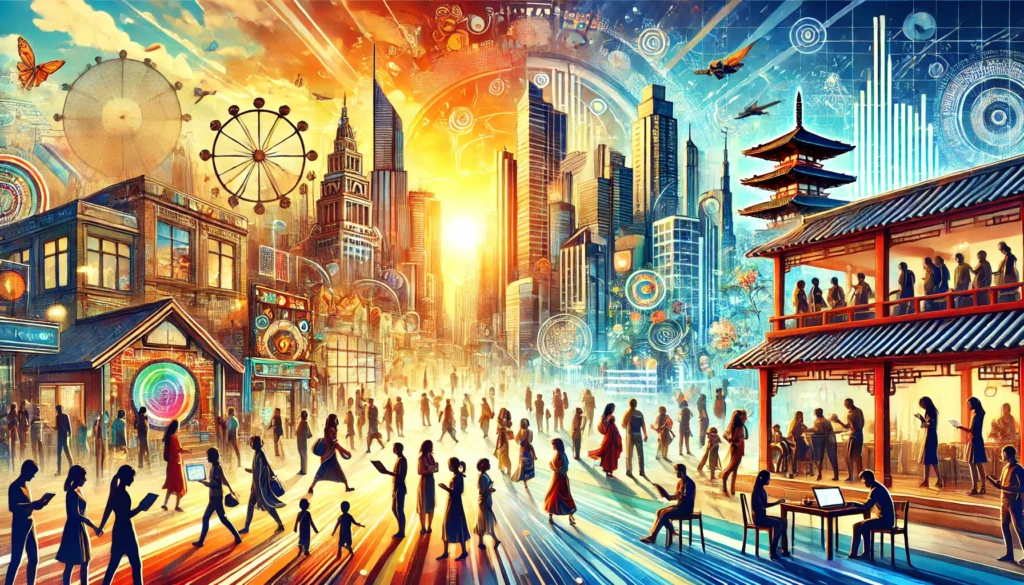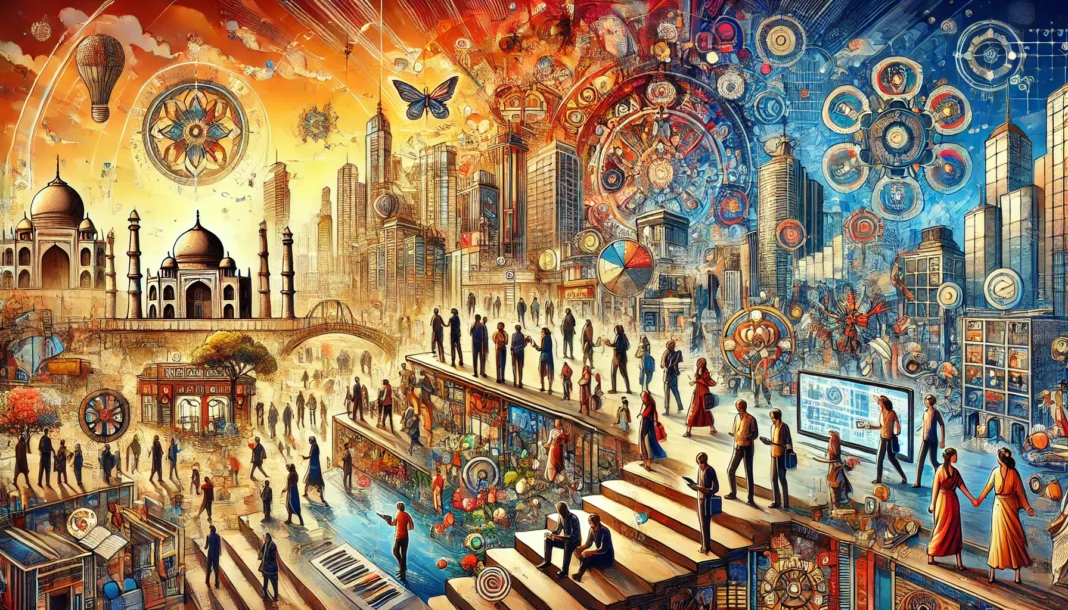In an interconnected world, social transformation and cultural shifts have taken center stage. These transformations are ongoing processes that shape how we live, think, and interact. Social transformation involves changes in societal structures and institutions. Cultural shifts refer to changes in values, norms, and behaviors that influence identities. Understanding these dynamics is crucial for grasping the forces at play in communities. They have far-reaching implications on everything from family life to political ideologies.
The interplay between cultural values and norms is delicate. It reflects tradition versus modernity. This relationship shows both friction and innovation. Historical contexts and technology drive shifts quickly. This article explores factors behind social and cultural shifts. It also analyzes the past and the future for society.
Historical Examples of Major Social Transformation
To understand current social transformations, we must look at history. Major events impacted societal structures. They led to cultural shifts. One example is the Industrial Revolution. The shift from agrarian to industrial economies changed lifestyles drastically. It introduced new urbanization, labor, and technology. This revolution redefined family roles, social classes, and education. It laid the foundation for modern society.
Another change was the Civil Rights Movement. It addressed racial injustices in the U.S. It challenged segregation laws and attitudes. The movement led to shifts toward equality. It influenced struggles globally. Such moments show the power of social movements.
Factors Driving Cultural and Societal Change Today
In today’s world, many factors drive social transformation. Technology is a major driver of change. Smartphones and social media have changed how we communicate. They affect how we form relationships. Technology has changed how we understand the world. Digital media has created new norms. Immediacy and interconnectedness now shape values. This shift affects behavior, expectations, politics, and business.
Economic factors like inequality and labor shifts drive change. Demographic changes create diverse communities. Migration and aging increase diversity. These changes need inclusive adaptation. Climate change spurs activism. It influences norms around sustainability. This activism prompts changes in habits and policy.

Technology’s Role in Accelerating Social Transformation
Technology’s influence on culture is significant. Social media platforms like Facebook and Instagram changed how we connect. These platforms affect our values and behaviors. Viral campaigns bring attention to social issues and create change. The #MeToo movement used social media to expose harassment. It shifted public discourse on these issues.
Virtual communities and digital identities have emerged. They create new social structures. Belonging now transcends geographical boundaries. Virtual spaces allow diverse interactions. They also contribute to misinformation and polarization. Technology shapes social realities and plays a central role in society.
Generational Shifts: How Different Age Groups Shape Culture
Every generation leaves its mark on culture and societal norms. Baby Boomers, Millennials, and Gen Z differ in work, relationships, and activism. Baby Boomers often value stability and traditional family roles. Millennials and Gen Z prioritize flexibility, fulfillment, and equality due to economic instability and technology.
Generational differences are evident in the workplace. Older generations favor hierarchy. Younger employees prefer inclusiveness and collaboration. This clash shows a cultural shift challenging authority. Younger generations influence culture beyond work. They lead movements for climate action, justice, and equality.
The Impact of Social Justice Movements on Cultural Values
Social justice movements have shifted cultural norms and values. Movements like #MeToo and Black Lives Matter highlight inequalities. They address systemic injustices that exist in society. By amplifying marginalized voices, these movements influence attitudes toward equality. They also push for inclusiveness and accountability.
The impact of activism on policy and public perception is significant. Activism promotes awareness and encourages rethinking beliefs. It creates ripples of change affecting institutions, businesses, and behaviors. Social justice movements show how collective action can challenge the status quo.
Cultural Adaptation in an Increasingly Globalized World
Globalization blurs cultural boundaries, creating an interconnected world. Cultural adaptation is key in modern society. People migrate and interact, blending traditions into new norms, cuisines, languages, and art forms. Cross-cultural exchange enriches communities but raises questions about identity and losing traditional values.
The global flow of information means cultural shifts occur faster than before. Local customs are influenced by global trends. Multicultural societies need tolerance and adaptability. Individuals must embrace diversity while handling challenges of cultural preservation and assimilation.
Digital Connectivity and the Redefinition of Community
The future of social transformation will be significantly influenced by digital connectivity. The rise of technology has already blurred the geographical boundaries that define communities. In the future, communities will no longer be restricted by physical proximity; instead, they will be driven by common interests, beliefs, and aspirations, facilitated by virtual platforms. Social media and virtual spaces will increasingly provide opportunities for people from diverse backgrounds to come together, fostering a sense of belonging in an otherwise fragmented world. This redefinition of community will challenge traditional notions of belonging and identity, leading to diverse and more inclusive social interactions.
The Impact of Automation on Social Dynamics
Automation and artificial intelligence are expected to dramatically transform how people live and work. The rapid advancement of robotics and machine learning will displace many jobs traditionally performed by humans, which in turn will reshape social hierarchies and redefine labor roles. While the initial impact may increase unemployment rates, societies are likely to adapt by focusing more on creative and human-centric skills that are difficult to automate. This shift may lead to a future where work-life balance improves, allowing individuals to pursue their passions and create a more equitable social landscape.

Urbanization and the Evolution of Smart Cities
Urbanization will continue to accelerate as more people migrate to cities in search of better opportunities. Future cities will evolve into “smart cities” with cutting-edge technology designed to enhance quality of life, sustainability, and efficiency. Urban environments will become hubs for education, healthcare, and economic opportunities, driving societal progress. At the same time, the integration of smart technologies will improve connectivity between citizens and local governments, enabling better decision-making and promoting citizen participation in governance. The evolving urban landscape will give rise to new forms of social engagement and cooperation, redefining the relationships between individuals and their environment.
Gender Equality and Shifts in Social Roles
Social transformation in the future will be characterized by significant strides in gender equality and the breaking down of traditional gender roles. As societies become more aware of the need for inclusivity, future generations will witness the normalization of non-binary identities and the promotion of equal opportunities for all genders. Women, who have long been marginalized in various aspects of society, will continue to break barriers in politics, science, and business. Meanwhile, the roles of men will also evolve, with an increased emphasis on sharing caregiving responsibilities and rejecting harmful stereotypes of masculinity. This cultural shift will lead to a more balanced and equal society, allowing individuals of all genders to fully realize their potential.
Environmental Awareness and Collective Responsibility
The future will see a growing awareness of environmental issues and an increased sense of collective responsibility to address climate change. The impact of climate change on society will spur a shift toward more sustainable lifestyles, with citizens, governments, and organizations working together to combat environmental degradation. Social norms will evolve to prioritize green living, such as reducing carbon footprints, embracing renewable energy, and supporting ethical consumerism. As a result, individuals will begin to value ecological sustainability and shared responsibility, creating a future society in which environmental awareness is deeply ingrained into daily routines and behaviors.
How Social Transformation Affects Family Structures and Relationships
Social transformation profoundly impacts family structures and relationships. Changing norms reshaped what constitutes a family. Marriage rates are declining. Alternative family arrangements, like cohabitation or single-parent households, are more accepted.
Gender roles in the family are evolving. Women are no longer expected to focus on household duties. Both partners now share responsibilities equally. These shifts reflect changes prioritizing gender equality and autonomy. They also emphasize shared partnerships in family relationships.
Challenges and Opportunities in Social transformation
Social transformation brings opportunities for growth, but it also presents challenges. Cultural shifts often create tensions between generations, communities, and ideologies. The rapid pace of change leaves many struggling to adapt effectively. Older generations often resist new technologies or evolving social norms, leading to generational divides that affect relationships. However, younger generations tend to embrace change more quickly, especially in technology and social issues.
This difference leads to misunderstandings, but also potential for collaboration. Bridging these divides requires patience, dialogue, and empathy. By understanding each group’s perspective, society can work toward a balanced adaptation. Encouraging intergenerational communication helps to minimize conflicts. It also enables communities to take advantage of diverse experiences. In this way, social transformation can foster mutual respect and collaboration, ultimately leading to a more unified society.
These challenges present opportunities to foster understanding and empathy. As societies grow diverse, inclusiveness and respect become essential. Adapting to cultural shifts is an invaluable asset. Being resilient and open-minded helps communities navigate modern complexities.

The Social transformation: Predicting Upcoming Cultural Changes
Looking ahead, several trends are likely to define future cultural changes. The continued rise of technology, especially artificial intelligence, will reshape how we work, socialize, and even define personal identity. With the increasing integration of AI into everyday life, ethical considerations and societal values will need to evolve to address the complexities of human-machine interactions.
Climate change will also continue to influence cultural values, prompting societies to adopt more sustainable practices and fostering a culture of environmental stewardship. Generational shifts will keep redefining norms, particularly as Gen Z and subsequent generations grow up with heightened awareness of social justice, climate action, and mental health.
The future will be marked by the convergence of various cultural, social, and technological factors, creating a dynamic landscape where change is the only constant. Predicting the exact nature of these shifts is challenging, but the trends indicate a movement toward greater equality, technological integration, and cultural blending.
FAQ about Social Transformation and Cultural Shifts
What is social transformation and why is it important?
How do cultural shifts impact daily life?
What are some historical examples of major social transformations?
How does technology influence cultural evolution?
What role do generational differences play in social transformation?
How do social justice movements affect cultural values?
What is cultural adaptation and why is it important in a globalised world?
What challenges arise from rapid social and cultural changes?
How do shifts in cultural norms affect family life?
What cultural changes can we expect in the near future?
Conclusion
Social transformation and cultural shifts are complex, multifaceted phenomena that have shaped human societies throughout history and will continue to do so. From historical milestones like the Industrial Revolution to modern-day social justice movements, these changes influence how we see ourselves and interact with one another. Understanding the drivers behind these shifts—technology, globalization, economic factors, and generational differences—allows us to navigate better the challenges and opportunities arising as our world evolves.
By embracing change, fostering inclusiveness, and learning from history, society can adapt to the transformations ahead, shaping a future that reflects diversity, equity, and progress values. The ongoing dance between social structures and cultural values reminds us that change is inevitable and a powerful force for growth and innovation.

